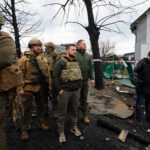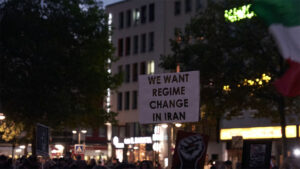Three US soldiers were killed in a drone attack carried out by an Iranian militia near the Jordan-Syria border. I expect a timely retaliation by the US, but what will that look like?
The Biden administration could choose to target Iranian-backed militias, Iranian military assets, or even Iran’s economy directly. Some of these are a bit more involved, but disrupting oil exports wouldn’t take much more than a fly-by of Iran’s primary export terminal on Kharg Island.
There will likely be global repercussions regardless of which option the US chooses; however, given the United States limited reliance on Middle Eastern energy, disrupting that system could prove beneficial for North American interests.
Here at Zeihan On Geopolitics we select a single charity to sponsor. We have two criteria:
First, we look across the world and use our skill sets to identify where the needs are most acute. Second, we look for an institution with preexisting networks for both materials gathering and aid distribution. That way we know every cent of our donation is not simply going directly to where help is needed most, but our donations serve as a force multiplier for a system already in existence. Then we give what we can.
Today, our chosen charity is a group called Medshare, which provides emergency medical services to communities in need, with a very heavy emphasis on locations facing acute crises. Medshare operates right in the thick of it. Until future notice, every cent we earn from every book we sell in every format through every retailer is going to Medshare’s Ukraine fund.
And then there’s you.
Our newsletters and videologues are not only free, they will always be free. We also will never share your contact information with anyone. All we ask is that if you find one of our releases in any way useful, that you make a donation to Medshare. Over one third of Ukraine’s pre-war population has either been forced from their homes, kidnapped and shipped to Russia, or is trying to survive in occupied lands. This is our way to help who we can. Please, join us.
TranscripT
Hey everybody. Peter Zeihan here coming to you from Colorado. It is the 29th of January and the news today is that in a rocket attack, a Iranian militia operating near the border of Jordan in Syria managed to get a missile into an American base and kill three people in the vicinity of one of the barracks. These are the first deaths of American military personnel since the Iranians started pushing groups like the Houthis to attack Americans and international commerce in a large volume.
And it’s probably going to merit a response. Something to keep in mind is when the United States couple of weeks ago decided to start taking military action against the Houthis in Yemen. It wasn’t because these Iranian backed groups were attacking commerce in general. It’s because they fired an anti-ship missile at a U.S. military vessel, and that’s what started it all off.
So working from that same logic, now that some Americans have actually died, you can expect the Biden administration to strike back. The question is how? There’s kind of three things to consider. None of the options are great. Option number one, you do a semi proportionate because the Americans always believe in overkill assault against the militias that Iran backs either in the area in question or somewhere in the broader Middle East.
The problem with this is it doesn’t solve the problem. The people who are doing the attacks aren’t Iranian. They’re just using Iranian equipment and sometimes a little bit of Iranian intel. And even if you were to wipe them all out, they come from sectarian groups who are opposed to their local geopolitical orders. And so they tend to oppose Sunni groups who tend to be in the majority, especially in places like Jordan or in the case of Iraq, where you have a pseudo democracy.
And in these cases, even if you take them all out, you just have an aggrieved minority that would, again, push people in that the Iranians would recruit. So it might make things calm down for a few weeks to months, but it’s certainly not any sort of lasting solution that’s going to change the logic in Tehran at all. The second option is to strike military assets in Iran proper.
The idea is you go after the personnel that are making these decisions. The problem here is that there’s a lot of them. Iran isn’t like most strongman autocracies. You’ve got a ruling elite of the religious, the class, the mullahs, who’s over 10,000 people. And even if you were to somehow magically carry out an assassination program and within 24 hours, kill the top thousand of them, I mean, sure, they’d have some reshuffling, but it actually wouldn’t disrupt the regime in any meaningful way.
In addition, Iran is a series of mountains. It’s basically a fortress. And if you wanted to go in there and knock the government out, you would need a force significantly larger than what the United States pushed into Iraq, which is ultimately a flat and somewhat desert community. And that means you’re going over a mountain range in mountain range and mountain range.
So the distances are far. The logistics would be hard. The geography plays to the defenders strength. And then even if you were successful, well, then what are you going to stick around and try to reconstruct Iran in the way that we did Iraq? I think I think the U.S. learned that that’s not an easy thing to do. So and again, this wouldn’t change any of the logic in Iran about what they’re doing in the broader reading, if anything, were to intensify it.
That leaves us with the third option, which is a military option against Iran’s economy. Now, Iran, while it is nowhere near the peak that it once was back in the seventies, is an oil producer. What it was exporting, more than 4 million barrels a day is still in the game and still exports about a million barrels a day.
And that income is the primary source of hard currency that the Iranians use to fund everything that they do from purchasing social stability, from their population at home to funding these rocket attacks against U.S. military targets throughout the broader region. And unfortunately for the Iranians, it all flows through a single point called Kharg Island, which is on the northeast shore of the Persian Gulf.
And it would be very, very, very easy for the United States just to destroy the loading facilities or maybe even the storage tanks and the pumping stations in Kharg. They could probably do it with a handful of sorties, would probably take less than an hour. Iranian missile defense is is not very good. Their air defense is not very good either in the U.S. obviously is very good at striking in those sorts of conditions, especially when you’re talking about something that is on the coast.
So you don’t have to fly over too many defensive layers to get to it. It’d be a cost to this, of course, should the United States decide to do this step. It would take the role of the erstwhile global guarantor of maritime security and have the United States taking very discrete shots at very specific parts of the global economy that have relied upon international security in order to function.
And that means that any vessels that are part of a long supply chain along sail going through a dangerous area, near a dangerous area, or have multiple supply chain stops, meaning that if you interrupt just one of them, all of them become defunct. All of that would be in danger. And that is the entire electronics supply chain in Southeast Asia and East Asia.
That is the entire oil supply chain which either is sourced from or passes through the Middle East. The consequences of that would be significant on a global basis. But if you want to take the American populist view, which is something that Biden and Trump agree on, is that a lot of that doesn’t really matter. And in fact, there’s something to be said for stalling those international systems because they favor North American solutions.
The United States doesn’t get energy from this region anymore. Canada doesn’t, Mexico doesn’t. So the economies that we care about the most are heavily insulated already. And the economy that we’re most dependent upon or the most concerned about is China. And they get all of their energy from Pittsburgh reach that well, not all, but like half. And so if the Biden administration does take this step, two things will very much be in motion very quickly.








